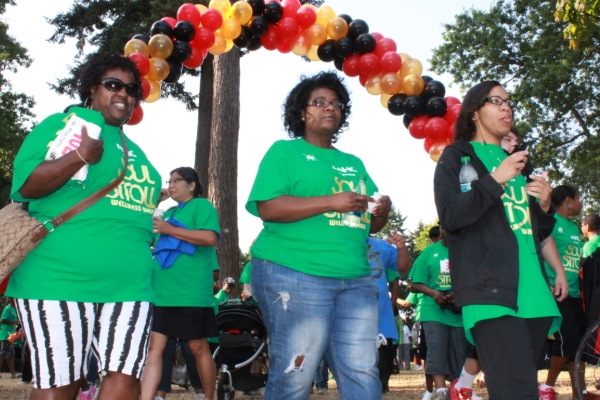- Home
- News
- Opinion
- Entertainment
- Classified
- About Us
 MLK Breakfast
MLK Breakfast- Community
- Foundation
- Obituaries
- Donate
05-01-2024 8:52 am • PDX and SEA Weather

This August 16, 2014 photo shows women taking part in the Portland African American Health Coalition's Soul Stroll. The event encourages women and men to improve their health through exercise and healthy lifestyle choices. Photo: Helen Silvis
A new women’s health study ranked the state of Washington #22 nationally and gave it a C+ grade, while Oregon was listed at #26 and given a C.
That’s according to the 2014 Women’s Health Report Card released last week by the Alliance for a Just Society.
The non-partisan think-tank boils down government statistics on health issues facing women as a whole, as well as broken down by race, tallying government research data points into focused grades and rankings
The study was carried out in cooperation with Washington Community Action Network, Oregon Action, the Center for Intercultural Organizing, and grassroots nonprofits around the country.
Washington was graded C+ for coverage (#22); C for access (#24), and C for outcomes (#24). On access, Oregon earned a C- (30th); on coverage, a C (#24); and on outcomes, Oregon earned a C grade (#25).
The report shows that among non-elderly women in 2013, 14.7 percent had no health insurance in Washington State, while 15.8 percent lacked insurance in Oregon.
It’s unclear how the roll-out of the Affordable Care Act has impacted that so far.
“Politicians must put aside partisan bickering, advocate for women, and take action to improve women’s health by moving forward with a proactive health equity agenda,” said Alliance for a Just Society Executive Director LeeAnn Hall.
The 2014 Women’s Health Report Card draws on government data to rank each state on 30 specific health measures. Researchers from the Alliance use the numbers to build state rankings and grades, analyze race-based disparities, and offer specific recommendations for state action to improve women’s health.
The best-ranked states were: Delaware (#1), Massachusetts (#2), Vermont (#3), Hawaii (#4), and Connecticut (#5).
Those with the worst scores by and large are states that refused President Barack Obama’s offer of expanded Medicare coverage, including Texas (#50), Montana (#49), Georgia (#48), and Florida (#47); Nevada (#46) did expand federal coverage.
The study tracks racial disparities in community health as they are impacted in three areas: health coverage for women; women’s access to care; and women’s health outcomes.
This year’s report indicated racial disparities remain significant, and that even the two states that received A's in every area could improve.
“In 28 states, the uninsured rate for black women was at least 10 percent higher than for women overall; in 17 states, it was at least 20 percent higher,” according to the report.
“The disparities were even wider for Latina women: in 49 states, the uninsured rate for Latina women was at least 20 percent higher than for women overall; in 44 states, it was at least 50 percent higher; and in 18 states, it was at least twice as high.”
Specifically, the report called out the hypertension rate for Black women nationally; the diabetes rate for Latina women; asthma rates for Native American women; and the infant mortality rate for Black, Hispanic and Native American women.
“This report card shows Oregon has an average record on women’s health. Though this is better than a failing grade, it’s not nearly good enough for women and the families that depend on them, and especially for women of color,” said Darlene Huntress, executive director of Oregon Action.
“These grades should serve as an urgent call to action for Oregon leaders,” she said. “It’s time to get past political gridlock and take concerted action to improve women’s health. Legislators must take steps that invest in community-based outreach and health coverage enrollment strategies targeted toward low-income women and communities of color.”
The report includes a detailed list of policy recommendations, including: Implement Medicare expansion in all states that have failed to do it; invest in community-based outreach and insurance enrollment strategies targeted towards women of color and low-income communities; and push for better competition and oversight on health plans offered through the marketplace.
On women’s access to care, the report recommends: Enforcing strong standards to ensure timely care; make sure women have full access to reproductive care; invest in workforce diversity; strengthen cultural competency; and ease provider shortages by investing in community clinics and services in underserved areas.
On health outcomes, the report recommends: More investment in preventive care; improve chronic disease management; and improve data collection.
The report’s Oregon findings were endorsed by US Rep. Suzanne Bonamici, who is running for re-election.
"All women deserve access to quality, affordable health care and family planning services," Bonamici said. “Cancer screenings, immunizations, and reproductive care can help prevent more serious health problems that, if left untreated, will ultimately lead to higher health care costs.
“No one should go without seeing a doctor or health care provider because of inability to pay. Although the report shows progress, we still have work to do until all Oregonians and Americans - women, men and children - can access the care they need."
The 2014 Women’s Health Report Card is available online at http://bit.ly/HealthReportCard